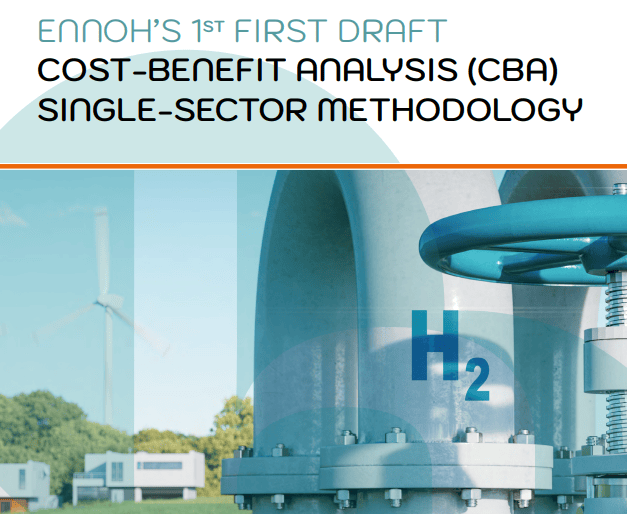ENNOH launches a Public Consultation on the first draft of its Cost–Benefit Analysis (CBA) Single-Sector Methodology
Launch date: 15 September 2025
Closing date: 15 December 2025 end of business (submissions received after this date will not be considered)
Introduction
ENNOH is honoured to announce the launch of a Public Consultation on its first draft Cost–Benefit Analysis (CBA) Single-Sector Methodology, marking a significant milestone for the association. We invite all interested parties – including project promoters, national regulatory authorities, Member States, industry representatives, and civil society organisations – to take part in shaping the draft CBA Single-Sector Methodology.
The consultation represents an important step in ENNOH’s commitment to openness, stakeholder engagement, and transparency. Its purpose is to gather evidence, perspectives, and feedback to ensure that the methodology is robust and aligned with Regulation (EU) 2022/869 on guidelines for trans-European energy infrastructure (TEN-E).
Background
Pursuant to Article 11 of the revised TEN-E Regulation (EU) 2022/869, ENNOH has developed a draft CBA Single-Sector Methodology. The Regulation requires the methodology to be prepared in a transparent manner and in close cooperation with stakeholders.
This first consultation provides stakeholders with the opportunity to contribute directly to the methodology’s design and to help ensure its consistency with the EU policy framework and with established practices at national level.
Scope of the Consultation
Stakeholder feedback is sought on all substantive elements of the draft CBA methodology, including:
- A new approach to explaining and presenting the modelling tools used in the assessment process, aimed at enhancing transparency and user understanding.
- An expanded methodological scope covering additional infrastructure levels within the assessment process.
- A revised indicator framework, incorporating new indicators, adjustments to existing ones, and alignment with the policy objectives of the TEN-E Regulation.
- The introduction of the concept of curtailed hydrogen versus disrupted hydrogen, and its implications for the assessment process.
How to Participate
Stakeholders are invited to download the questionnaire and submit their responses via public.consultations@ennoh.eu.
Submissions may be published in full unless specific sections are clearly marked as confidential. Participants are responsible for identifying and designating any confidential information contained in their responses.
If a stakeholder prefers their response to be treated as anonymous, this preference should be indicated when sending the contribution.
If you have any questions during the consultation period, please contact Nils Melcher at nils.melcher@ennoh.eu OR Alexander Kättlitz at alexander.kaettlitz@ennoh.eu.
The consultation will remain open for a period of three months. It will commence on 15 September 2025 and close on 15 December 2025 (end of business). Submissions received after the deadline will not be considered.
Procedure
All contributions will be carefully assessed by ENNOH. Feedback deemed relevant and substantiated will be incorporated into the final CBA methodology.
In line with Article 11(2) of the TEN-E Regulation, ENNOH will publish a report on the consultation process, summarising the comments received and explaining how they were considered.
An interim methodology will be published by 2 February 2026. The final draft Methodology will be submitted to ACER and the Member States once ENNOH is legally established.
Legal Background
In accordance with Regulation (EU) 2022/869, ENNOH and ENTSO-E are required to publish preliminary draft methodologies, conduct an extensive consultation, and seek recommendations from Member States and stakeholders. The consultation process must be open, timely, and transparent.
A report on the consultation will be published, including justifications where recommendations were not, or only partly, considered.
